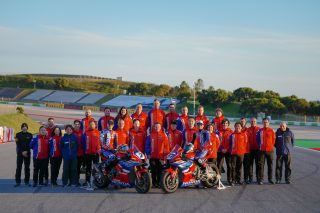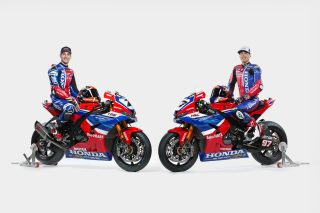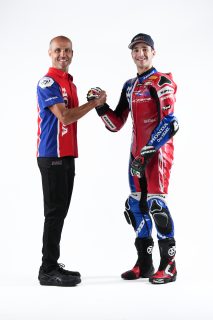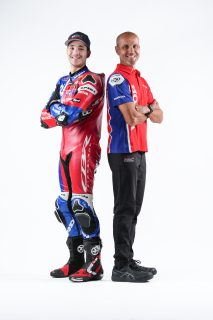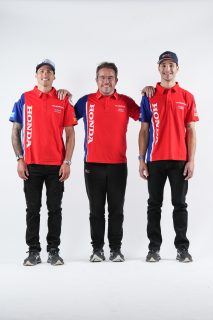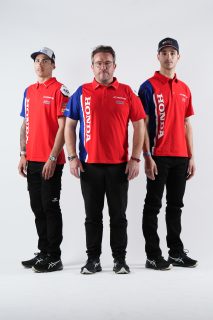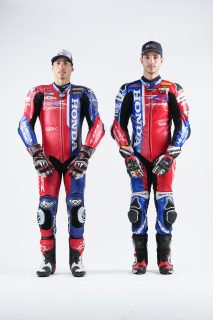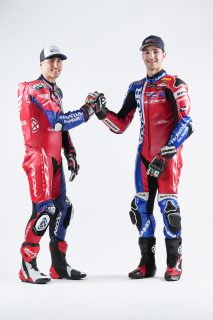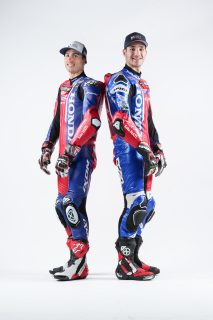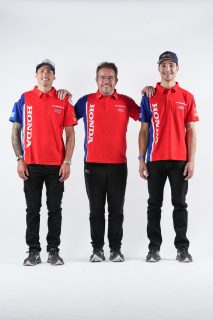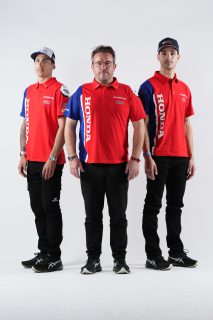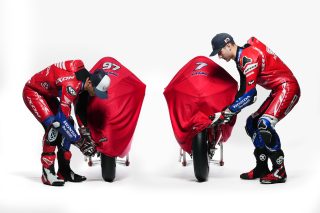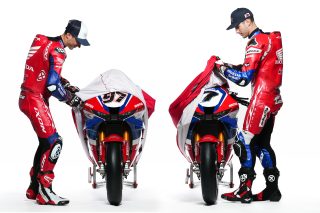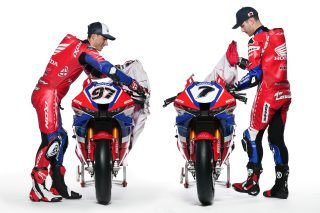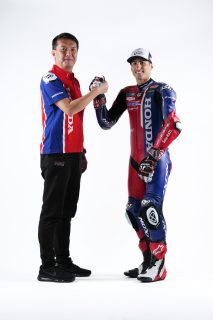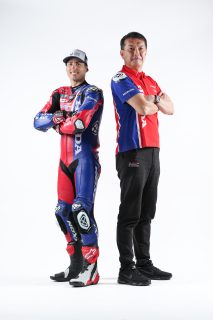Team
When the Superbike World Championship debuted in 1988 as an international series for production-based motorcycles, organizers aimed for horsepower parity by restricting four-cylinder engines to 750cc but allowing twins up to 1000cc. Despite this, the HRC V4 RC30 dominated in the early days at the hands of American rider Fred Merkel, winning both the Riders’ and Manufacturers’ championships in the first two years and retaining the Manufacturers title in 1990.
After a few years of race development, the competition’s larger displacement twin-cylinder machines began to make things difficult for the four-cylinder models, but HRC teams forged on and in 1997 won both the Riders’ and Manufacturers’ championships with American John Kocinski aboard the 750cc V4 RC45. Then, in 2000, HRC engineers responded to the displacement rule with a twin of their own—the 1000cc V4 VTR1000 (also known as the RVT1000 or RC51), which enjoyed immediate success, Colin Edwards securing that year’s Riders’ title. Two years later, Honda and Edwards repeated the feat in dramatic fashion, the American securing a double win in the final round at Imola to top Troy Bayliss by 11 points.
In 2003, rule changes removed the 250cc advantage for twin-cylinder machines, while MotoGP completed its transition to four-stroke engines. HRC made the decision to focus its efforts on Grand Prix racing and withdrew from WorldSBK. Nonetheless, the Honda inline-four CBR1000RR FIREBLADE was still successfully employed by satellite teams, most notably in 2007 when James Toseland won the Riders’ championship with the Hannspree Ten Kate team.
In 2019, Honda participated in a joint project with Moriwaki and Althea, entering the WorldSBK championship with an HRC-supported outfit, the Moriwaki Althea Honda Team, which fielded Leon Camier and Ryuichi Kiyonari on CBR1000RR SP2 machines. The season proved quite challenging but was at the same time fruitful with a view to 2020 activities.
Honda HRC team
In 2020 Honda returned to WorldSBK with Team HRC, a full factory team, based in the same HRC Europe office (in Barcelona, Spain) as MotoGP and Dakar.
HRC signed 2019 WorldSBK runner-up Alvaro Bautista, and Leon Haslam, two highly competitive and very experienced riders, to race its CBR1000RR-R SP FIREBLADE, a brand-new, very powerful machine, created with a clear focus on track performance.
The 2020 season began with the official TeamHRC presentation, which took place at the Honda Welcome Plaza Aoyama in downtown Tokyo. This was followed by the opening round of the championship at the Phillip Island circuit in Australia, which also ran as scheduled. Unfortunately, though, the rapid spread of the COVID-19 virus soon impacted on 2020 WorldSBK calendar, testing sessions and the Honda factory’s development plans, hampering the progress of the new bike as a result. Despite the setbacks, the HRC engineers, TeamHRC and its riders continued to work hard together to develop the bike’s setup and increase its competitiveness throughout what was ultimately a shortened season.
With riders Alvaro Bautista and Leon Haslam both confirmed for the 2021 season and the team further strengthened with the arrival of former rider Leon Camier as Team Manager, Honda worked hard to putting the experience gained in 2020 to good use in the next season. Two podiums and a series of races fighting for the top positions have shown progress in terms of results and performance for Team HRC in 2021 but not yet at the level Honda expect and aim to achieve.
On October 26th 2021 Honda announced that it had reached an agreement with Spanish riders Iker Lecuona and Xavi Vierge to compete on its official World Superbike Team in 2022 aboard the factory Honda CBR1000RR-R FIREBLADE.
Lecuona was born in Valencia (Spain) on 6 January 2000 and made his debut in the Moto2 World Championship in 2016. In 2021 completed his second year in MotoGP before switching to the WorldSBK Championship. Xavi Vierge was born in Barcelona (Spain) on 30 April 1997 and concluded his sixth season in the Moto 2 World Championship before switching as well to the WorldSBK Championship in 2022.
Lecuona achieved his first podium in the category at his second Round in 2022 (Assen), Vierge at the second Round of 2023 (Indonesia) and both battled in the top five on many occasions.
Having made an impression on and off the track for their talent, speed, and positive attitude, Lecuona and Vierge were reconfirmed by Team HRC for the 2024 and 2025 seasons. The first half of the 2024 championship proved challenging for both riders, but the duo remained focused, with the results picking up significantly over the second part of the season. Additional testing sessions for the team paid off, with both Xavi and Iker consistently fighting for the top five over the last five rounds. The squad’s hard work culminated in a podium for Iker at Estoril, when he crossed the line third in race 1.
For the 2025 season, the Honda HRC team continued its participation in the MOTUL FIM Superbike World Championship with Iker Lecuona and Xavi Vierge. The campaign was marked by steady progress in terms of performance and development, with Vierge concluding the championship in seventh place overall, the best result achieved by Honda since its full factory return to WorldSBK in 2020. Lecuona also contributed to the evolution of the CBR1000RR-R FIREBLADE, regularly fighting for positions inside the top ten and ultimately finishing thirteenth in the riders’ standings.
For 2026, the Honda HRC team will begin a new chapter with the arrival of British rider Jake Dixon and Thai rider Somkiat Chantra. Dixon joins the project after several successful seasons in the Moto2 World Championship, during which he achieved multiple race wins and podium finishes, including a highly competitive campaign in 2025. Chantra, the first Thai rider to win a Moto2 Grand Prix, brings proven international experience and a background that also includes MotoGP participation with the LCR Honda team in 2025. Both riders arrive with race-winning credentials and solid technical foundations, qualities that align with HRC’s objectives as development of the CBR1000RR-R FIREBLADE platform continues into the next phase of the project.
Honda WorldSBK Podiums
1988 – 2024: 398
First Podium: 03-04-1988 Fred Merkel (Honda RC30 – Rumi Honda) Donington Park (UK) – Race 2 – (2nd)
Last Podium: 12-10-2024 Iker Lecuona (Honda CBR1000RR-R FIREBLADE) Estoril (POR) – Race 1 – (3rd)
Honda WorldSBK Race Wins
1988 – 2024: 119
First Win: 30-04-1988 Fred Merkel (Honda RC30 – Rumi Honda) Hungaroring – Race 1
Last Win: 15-05-2016 Nicky Hayden (Honda CBR1000RR FIREBLADE) Sepang – Race 2
Honda WorldSBK Rider Title
1988 – 2024: 6
1988 Fred Merkel Honda RC30 (Rumi Honda)
1989 Fred Merkel Honda RC30 (Rumi Honda)
1997 John Kocinski Honda RC45 (Castrol Honda-HRC)
2000 Colin Edwards Honda VTR 1000 SP / RC51 (Castrol Honda-HRC)
2002 Colin Edwards Honda VTR 1000 SP-2 / RC51 (Castrol Honda-HRC)
2007 James Toseland Honda CBR1000RR (Hannspree Ten Kate Honda)
Honda WorldSBK Constructor Title
1988 – 2024: 4
1988 (142 points)
1989 (368 points)
1990 (399 points)
1997 (486 points)
FIREBLADE statistics
Debut: Valencia 2004
Model: CBR 1000RR
Rider: Chris Vermeulen
Team: Ten Kate
FIREBLADE Wins 2004 – 2024
43
FIREBLADE First Win: 13-06-2004 Chris Vermeulen CBR1000RR (Ten Kate Honda) – Silverstone (UK) – Race 2
FIREBLADE Last Win: 15-05-2016 Nicky Hayden (Honda CBR1000RR FIREBLADE) Sepang (MAL) – Race 2
FIREBLADE Podium 2004 – 2024
146
FIREBLADE First Podium: 28-03-2004 Chris Vermeulen CBR1000RR (Ten Kate Honda) – Phillip Island (AUS) Race 1 (2nd)
FIREBLADE First Podium: 12-10-2024 Iker Lecuona (Honda CBR1000RR-R FIREBLADE) Estoril (POR) – Race 1 – (3rd)
